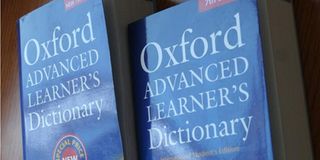We should write words the way they are pronounced

Copies of Oxford Advanced Learner's dictionary. PHOTO | FILE | NATION MEDIA GROUP
What you need to know:
- For, while humanity has always spoken a language, writing was invented only very long after humanity had evolved.
- For human beings were speaking language long before they invented writing.
One problem that nonplusses English learners is that pronunciation systematically contradicts spelling. English is the only language I am familiar with in which spelling stands as menacingly as Okot p’Bitek’s elephant. Why do Englanders write ought when they mean ot (the latter being also the word for a “house” in own mother tongue Dholuo)?
In any language, pronunciation, not spelling, is the basic significance of words. For, while humanity has always spoken a language, writing was invented only very long after humanity had evolved. In practically all languages, indeed, spelling and pronunciation are identical. Only in the Western European languages of English and French do we find the strange phenomenon in which spelling and pronunciation clash heavily and gratingly.
Resting squarely on a Teuto-Germanic fundament, English and French are the two Western European tongues with an imposing Mediterranean (Greco-Latin) roofing in such essential areas of human activity and thought as agriculture, philosophy, religion, science and technology. Spelling is not and cannot be a natural characteristic of language.
INVENTED WRITING
For human beings were speaking language long before they invented writing. Spelling, in other words, is an aspect only of writing, not of speech. Spelling was imposed on language only after writing had been invented in Nilotic Egypt much more recently. Indeed, in practically all languages, pronunciation and spelling remain identical.
To reiterate, I am not familiar with any other linguistic system in which, as in English and French, the way you pronounce a word is always likely to contradict the way you write it, and gratingly. French, a daughter of Latin, is the only other linguistic human tool I am familiar with which is beleaguered by the same grating clash between spelling and pronunciation.
Even in such a language, however, the clash developed only in history. Indeed, the clash took root very recently. It took place, in other words, only after writing had been invented in Nilotic Northern Africa and elaborated in Mesopotamia (a land called so because it is situated between two other history-making rivers, namely, the Tigris and the Euphrates).
SPELLING
In history, a number of Westerners themselves have made powerful suggestions that a deliberate official attempt be made to bring to agreement both the spelling and the pronunciation of English words. I think it is high time. For it serves absolutely no useful purpose for a language which has become such a universal human tool to remain so discouraging to all human children, including even England’s, in its own written manifestation.
As very many historians of language have put it, written English is the expression of a language which died a natural death a very long time ago. Indeed, the original owners of that language — those who, in time, imposed it on humanity worldwide — are the ones who ought to take the initiative of modernising the way in which the language is written so that — since it has become universal property — the children of all nations can learn it not only easily but also with gusto.
Philip Ochieng is a retired journalist. [email protected]





